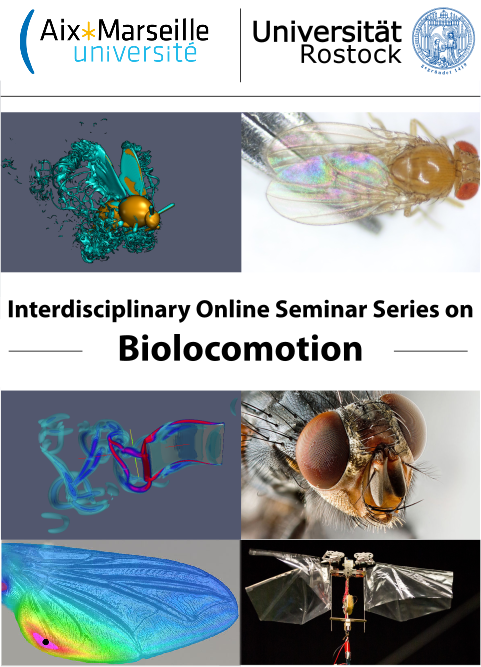
Dear colleague,
In our group, we have enjoyed the privilege to work in a highly interdisciplinary environment for many years, and the « Interdisciplinary Online Seminar Series on Biolocomotion » is born from the desire to continue our fruitful discussions online. While triggered by the Corona virus and the suspension of traveling, online seminars turn out to be a invaluable way of promoting international exchange and discussions with researchers around the world without the need for CO2 emissions from long-haul flights.
The idea of this seminar is to bring together researchers from Biology, Engineering, Numerics, Applied Math, Robotics and Physics working on the topic of biolocomotion. While our primary focus is on insect flight, we also welcome other contributions in related fields.
A non-exhaustive list of possible topics includes:
* Biology (Locomotor behaviors and control, muscle function, sensors and sensory processing, feedback cascades, neural coding, interactions with the environment, mechanics)
* Mathematics (applied) (Modeling, numerical methods, scientific computing, reduced order models, sparse data representation, wavelets)
* Physics (Modeling, elasticity and fluid-structure interaction, aero- and hydrodynamics, turbulence, material science)
* Engineering (Biomimetics & bioinspiration, robotics, flight control, manufacturing, autonomous systems)
We explicitly welcome contributions employing experimental, numerical and theoretical methodology, as well as all forms of locomotion: flying (primarily), swimming and walking. Speakers are invited by the organizing committee, but you can also contact us at biolocomotion.seminar@gmail.com if you want to give a presentation.
Researchers and students at any level (B.Sc., M.Sc or Ph.D) from any university or research institution are very welcome to participate and listen to the seminar. If you want to participate, please register at http://aifit.cfd.tu-berlin.de/wordpress/?page_id=449. You cannot participate without registration. There is no registration fee or any other fee, the seminar is free of charge and will always be. We value your privacy and will send emails only to announce seminar talks about a week in advance, and to communicate the link for participation a few hours before the talk. Currently, talks are given via the ZOOM software, but that might be changed in the future.
Please share this invitation with your students and colleagues who might be interested!
Typical presentations are around 40 minutes with an additional 15 minutes for questions. The usual slot for seminars is Wednesday 14:00 CEST (Rostock / Marseille time), but for speakers from overseas the slot can be shifted to 10:00 CEST (17:00 Tokyo time) or 16:00 CEST (10:00 New York time).
Please see http://aifit.cfd.tu-berlin.de/wordpress/?page_id=449
for further details and the updated list of speakers.
The first talks will be:
« Fish-like locomotion using bio-inspired plates«
27.05.2020, 15:00 CEST Ersan Demirer, Georgia Institute of Technology, USA
« Insect locomotion in granular materials: context and mechanisms«
03.06.2020, 14h00 CEST, Prof. Dr. Jérôme Casas and Dr. Miguel Piñeirua, Tours Université, France
« Bio-inspired actuation and aquatic locomotion using piezoelectric materials »
10.06.2020, 15:00 CEST, Prof. Dr. Alper Erturk, Georgia Institute of Technology, USA
« Numerical simulations of a butterfly-like flapping wing-body model: effects of wing planform, mass, and flexibility«
01.07.2020, 10:00 CEST Prof. Dr. Kosuke Suzuki, Shinshu University, Japan
We are very much looking forward to exciting presentations and fruitful discussions,
the organizing committee,
Dr. Thomas Engels, Universität Rostock
Prof. Dr. Fritz-Olaf Lehmann, Universität Rostock
Prof. Dr. Kai Schneider, Aix-Marseille Université